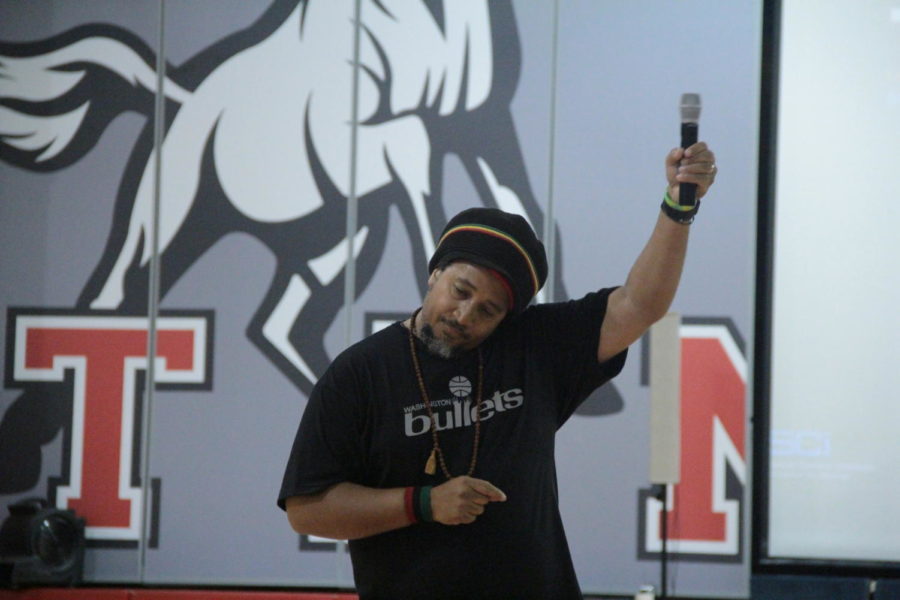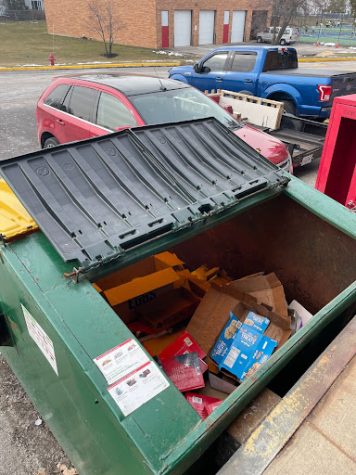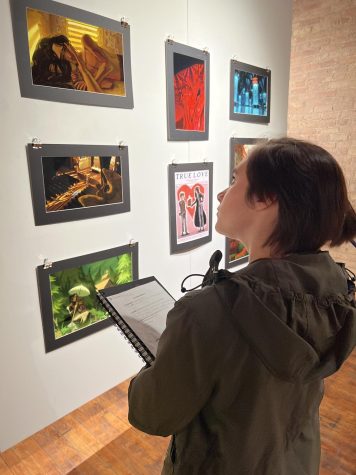Heart-to-heart: Students embrace speaker’s message
photo by yearbook staff Guest Speaker Calvin Terrell holds up his mic to encourage student engagement with his message during the all-school assembly on Sept. 6.
September 25, 2018
Many students who attended the Sept. 6 school-wide assembly with speaker Calvin Terrell filed out of the Main Gym that morning with a sense of unity.
The event ended with friends and acquaintances holding one another in tears while the audience was left with a strong message about embracing diversity.
Terrell gave out the message that “hurt people hurt people,” but “open hearts open hearts.”
“That quote really resonated with me and made me think about how my words, both good and bad, can impact someone,” Junior Damia Ali said.
Calvin Terrell is a founder of Equity Coach of Social Centric Institute, an organization made to train all ages to be educated on diversity and to enhance their interactions for global progress. Terrell has led workshops for more than twenty years, focusing on valuing diversity, equity and justice in schools and other workplaces.
Terrell’s presentation addressed some controversial topics, including social, physical and mental violence, as well as the history of racism and the impact of discrimination. Audience members were moved to tears when Terrell spoke about the deaths of family members and close friends. Many more tears were shed when students lined up at the microphone to talk about the hardships of their life. Their words left a packed Main Gym in silence.
“Youth need to hear this more than anyone: Youth are not just the future or the tomorrow; you’re the now,” Terrell said in an interview. “I’ve worked with child soldiers, people around the world that have done horrible and beautiful things to try to transform communities.”
He added that he has seen youth not recognize their capabilities and powers because of how the world has said that the youth is just too young to make any big changes.
“I think the concept of a teenager is designed to trick people of their power because there are people who do not want to have young people formalize and systemize structural decisions,” he said.
As a result, Terrell speaks to youth across the nation in order to help empower them to make decisions that transform their communities and to let people know about the injustices of the world.
“Over half of the problems that occur within our society we don’t hear about, so for Calvin to come and speak our reality, [it] was so powerful, and it opened a lot of hearts and minds,” Senior Khari Thompkins said.
During lunch periods after the assembly, Terrell created comforting spaces in the DMR where students could meet with him in small groups. During these gatherings, he described the space he wanted MHS to be– “a place that’s not just safe but a healing place.”
At this time, he asked those in the room to answer the questions: “What are you dealing with, and what do you wish for?” After a long moment of silence, people slowly but courageously started to share their responses. Students described situations ranging from parental issues to mental issues and various other insecurities.
Terrell called these students warriors. He described people who were willing to have these hard conversations as warriors, and he added that everyone has the capability of becoming a warrior, which means having the courage to speak one’s truth.
“I agree with Calvin’s message because it was really powerful and truthful,” Thompkins said. “It opened a lot of students’ eyes to what our world is really like and helped them understand that the only way for change is if we speak out against what is happening.”
With the intention of opening up more students’ hearts, Terrell also offered opportunities for debate. Terrell listened to any disagreements and then rebutted with facts. Students recognized the reason for this discussion strategy.
“The first step to change is education,” Senior Aidan Afonso said. “People like to believe their own thoughts, but their own thoughts aren’t based on facts and, honestly, don’t really matter. Facts aren’t [dismissible], and Calvin brought in historical facts that made his argument credible without shoving it down your throat.”
Terrell has worked to perfect his message after interacting with thousands of students and watching them grow from his time with them.
“[The best part of being a peacekeeper is] seeing people remember their goodness authentically,” Terrell said in an interview. “Sometimes that’s through recognizing how they’ve been pain[ed] and feeling compassionate about that, saying I don’t want to be like that, seeing their prejudices, their judgements, the pains that they have survived and when people remember their power.”
He described peacemaking as a puzzle and explained that it requires confronting diseases and illnesses and discussing what separates us all and brings us back together.
Overall, Terrell urged people at MHS to make a difference. He further said that sitting back and not doing anything wrong does not make it a right.
As the president of Black Student Union and a member of Diversity Club Khari Thompkins, senior, said she has plans to continue to make safe places for students to speak their truth.
She said she wants to be “more of a voice within [the] school, speaking out against hate [and] discrimination, and just overall educating people and not being afraid to have those intense conversations about our reality.”
Other students also are looking at ways to influence the people around them and even themselves after this experience.
“I’m going to make an effort to make myself better. Watching what I’m saying and doing is going to be an immediate thing that I can do,” Afonso said. “Once I can get to a place where I’m recognizing the struggle of others, then I’ll try to show other people the same.”
After students heard Terrell speak throughout the two days at the assembly, during lunch periods and at an all-day workshop for invited student leaders, they learned to latch on to new values.
“My biggest takeaway was that even if I’m having a bad day, even if I’m tired or irritated, that I should always be mindful of my actions and the things I say,” Damia Ali, junior, said.
Having Terrell come into the school and leave a lasting impact on so many students was evident after the constant talk about his presentations.
“It was something we needed; it was a wakeup call,” Thompkins said.
But as Terrell and other students recognized, for the days with Terrell to have any real impact, students will have to find ways to be warriors in the days, weeks and years that follow.
“With every breath of their life, they either breathe peace or poison into the world,” said Terrell in an interview. “We are never doing nothing, so even when we sit back and watch the world, that is an agreement to what’s going on.”



